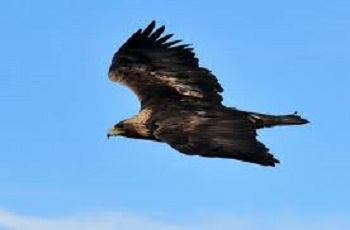Golden eagles in North America may have the timing of their migration shifted out of step with a seasonal boom in food they need to raise their young, according to scientists.
A project to track the impact of climate change on migrating animals has revealed that adult golden eagles are unable to shift the timing of their migration, according to BBC.
Lead researcher Scott LaPoint presented the findings at the annual meeting of the American Geophysical Union.
He explained that day length, or photoperiod, appeared to give the great birds the cue to go “as far and as fast as possible”.
When analysing tracking data, composed of 20 years’ worth of tagging birds with satellite tags and following their seasonal migrations, Dr LaPoint noticed an unusual pattern. Younger raptors would shift the timing of their journey, seemingly adapting to weather conditions and climate.
“But the adults get this photoperiod trigger and it’s ‘Time to go!’,” he told BBC News.
“I would have expected an older, wiser bird to better time their migration,” he added.
“But, with thesis [daylight] trigger, they don’t have the luxury of deciding. They need to get [to their nesting site] as soon as possible to initiate a clutch.
“They want to get their chicks as independent as possible by October, November.”
Birds younger than five years are sub-adult. They do not reproduce, so they are able to wait for good thermals to take them on a less energy-intensive journey north.
Northern-breeding golden eagles can travel thousands of miles to their wintering grounds.
And they have adapted to have their departure coincide with the first lasting snowfall or freeze and decreasing prey abundance.
If they’re coming up at the same time every year, and if there’s a change in that ecosystem due to climate change – whether that’s a shifting of when spring arrives, or more extreme weather events – that time of arrival could be less optimal, said Dr LaPoint.
“We’re potentially disrupting this synchrony. And if the birds aren’t able to adapt, I’m not sure what to expect.”
H.Z

